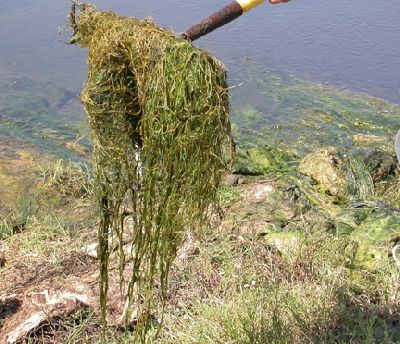
Ecological Importance
Also known as ditch grass, widgeon grass is a close relative of the naiads and horned pondweed and shares their ability to produce large numbers of seeds. This makes it an important food provider for waterfowl along with providing an excellent cover for fish. All the plant parts are eaten by waterfowl (over 5,000 seeds were found in one duck). Widgeon grass is often used for habitat rehabilitation.
Problems
Widgeon grass normally does not create problems within lakes and ponds with the exception of swimming areas and around docks from time to time.
Plant Description:
Widgeon grass is a completely submerged perennial plant with single or multi-branched stems up to 3 feet long. Leaves are alternate, simple, and thread-like (less than 1/32 of an inch wide) up to 4 inches long with sheaths. Flowers and fruits in clusters at the end of individual stalks. Fruits are small (< 1/32 inches), dark-green and pear-shaped. Widgeon grass can live in fresh or brackish water to 10 ppt (parts per thousand) salinity or higher.
Hints to Identify
When not in flower or with seeds, widgeon grass closely resembles horned pondweed (Zanichellia palustris) and sago pondweed (Stuckenia pectinata). Unlike widgeon grass, however, horned pondweed has opposite to whorled leaves, and the leaves of sago pondweed are in bushy clusters.
Common Application Questions
Q. How much should I treat?
A. Spot treat as needed to maintain navigation channels and swimming areas. Remember this plant is very beneficial and should not be treated where it is not a nuisance.
Q. When is the best time to treat?
A. Once water temperatures are around sixty degrees or warmer and/or the plant is actively flowering. Widgeon Grass responds equally well to herbicide treatment when mature.
Q. How often do I need to treat Widgeon Grass?
A. Generally one to two treatments per season is enough.
Q. How long before I see results?
A. Generally within two to three weeks things will be cleared up.
| Homeowner Treatment Options |
| Cutrine® Plus Liquid |
| Alligare® Diquat Herbicide |
| *Aquatic Biologists recommends implementing preventative management techniques and physical removal prior to, or in conjunction with treatment. |
